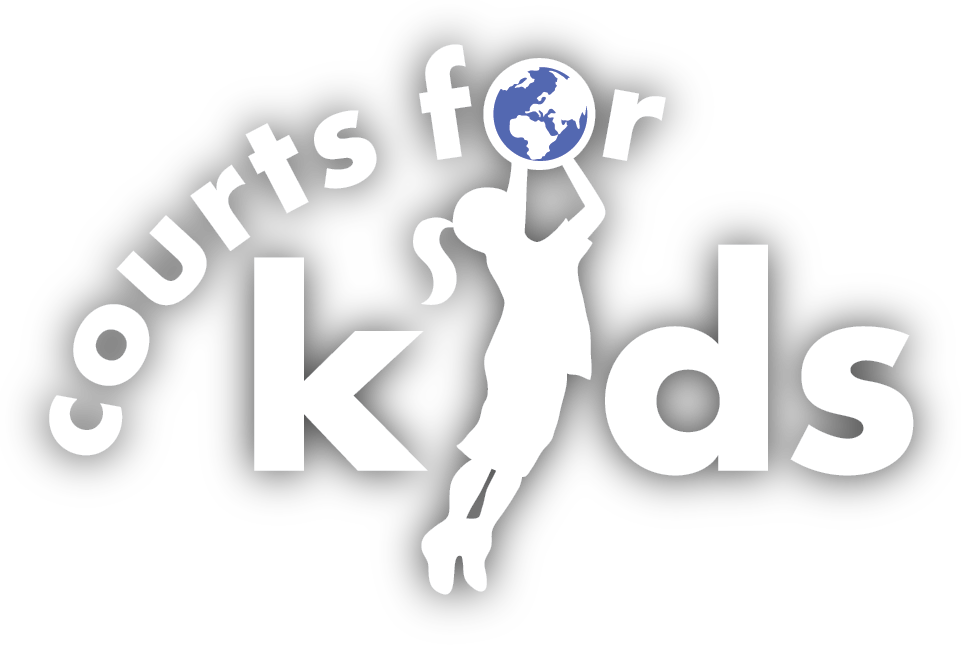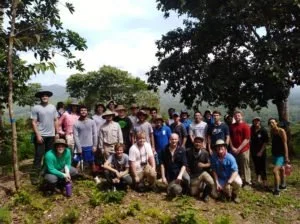Jesuit NOLA Students Experience Community in Puerto Lara, Panama
Back in December of last year, a group of 23 or so guys, myself included, gathered together and decided to select a Courts for Kids project in Panama for our senior service project the following summer, July of 2018. What we initially thought was a wild idea turned into, perhaps, the most exciting and fascinating experience any of us have undertaken.
After much planning, organizing, packing, vaccinations and much more, my friends and I departed from New Orleans on the morning of July 5 on a flight to Miami. From there, we took a second flight to Panama City, where we resided in a hostel for the night. Our group was amazed upon our arrival into the capital as we took in all the sights, sounds, and culture - what was, quite literally, foreign land to all of us. The hostel seemed like a luxury resort compared to the living conditions we would later be exposed to in the village of Puerto Lara. The low-pressure cold shower, poor plumbing, and tightly crammed rooms of the hostel were much different conditions than what we were used to back in the States. All that aside, our group departed from Panama City early the next morning after a delicious breakfast and set off for Puerto Lara in the province of Darien.
After picking up one of our Peace Corps volunteers, Chandler, we rode some four hours in a small bus that, luckily, was air-conditioned. Nearly everyone was eager to get off that bumpy bus as our excitement and anticipation built upon arrival at out ultimate destination. We got off, unloaded our luggage, and quickly settled into our spacious bungalows. After blowing up our air mattresses and hanging up our mosquito nets, we were treated to a marvelous dinner prepared by volunteer local women. Later that night, we assembled in the community meeting center alongside numerous community members where we were introduced by both the jefe and the president of the village, who were named Julio and Rolando, respectively.
Before the trip, we were told by one of our chaperones, Mr. Borg, to expect the worst and hope for the best when it came to the conditions of the village. While we weren’t surprised by the fact that there was no A/C or running water, it was much to our surprise that many people had cable TV and cell phones, and the village possessed several convenience shops and a beautiful, newly-completed paved road! In addition, many of us were skeptical as to how the locals would react to a group of Americans coming into their homes and using their tools to build a sports court on their land. However, our fears were alleviated the very next day when we actually began work on the court.
The first two days were spent preparing the land, wheel-barrowing hundreds of loads of dirt from a nearby field to the court in an attempt to make a level surface. Although it was a tedious and daunting task, both us and the Panamanian men powered through the work and completed the task. It was also during this time where we met and conversed with the local workers using our little knowledge of Spanish. While some of the men laughed and played while we worked, most accepted us with open arms and were overjoyed with our work-ethic and humor. At the end of a hot, long day of work, we joined our new friends for a game of futbol (soccer), which team Americano won 3-2.
Our work the next two and half days was what really separated “the men from the boys.” We had to cover and spread the future court with sand and compact it. Soon after we started mixing concrete, one of our concrete mixers broke, and we were forced to mix the concrete for the majority of the court by hand. The excruciating process involved 20 or so men, both Panamanian and American, mixing together hundreds of pounds of sand, cement, fiberglass and water with hand tools and pouring the concoction into blocked-off sections. We generally worked from 9 am to 1 pm, coming back to home base for a meal and a World Cup game, and then back to work until sunset.
We completed the court on Wednesday, which left us a couple of days to immerse ourselves into the rich culture of Puerto Lara. We went on a 3-hour hike to the peak of a nearby mountain one day, as well as an incredibly shaky boat ride down the river to an island another day. Some of us who didn’t go exploring the luscious surrounding terrain stayed at home base playing card games and running on the streets with the local children, playing soccer with our friend Angel and his friends, buying soft drinks from the shops and chatting with local boys and girls. Arguably some of the most memorable experiences from our time in Puerto Lara were going out in small groups and eating dinner with different local families in their homes, participating in Wounaan tribal dances and getting Jagua temporary tattoos on the cultural night, and, most importantly, playing sports with the locals on the beautiful new court following a highly anticipated inauguration ceremony on the last day.
Overall, I would say that this Courts for Kids project is the coolest experience my classmates and I have ever had. While we didn’t quite know what to expect at first, we made the most of our trip and had the most fun any of us have ever had. Once we got past the no cell phone, no A/C, bugs, rooster crows early in the morning, and cold bucket showers, we dove head first into everything the community of Puerto Lara had to offer. We formed many new relationships with the friendliest and most accepting group of people I have ever met, and we also tried many new things that many others can’t say they have done.
I would like to thank Juan Carlos and the entire Courts for Kids organization for giving us this incredible opportunity, our faculty chaperones, Mr. Bourg and Mrs. Bustamante, for putting up with our shenanigans for 11 days, my parents for allowing me to go on this trip, and my classmates for undertaking this experience with me. Most importantly, I would like to thank the people of Puerto Lara for being such good hosts and treating us with the utmost hospitality. I hope that they will remember and cherish our time together and that they get great use out of their new multi-purpose court. I also look forward to going back home and sharing my story with others. The community and people of Puerto Lara will forever hold a special place in my heart. - Jack
“My high point from the trip was definitely the ceremony for the court. Seeing the locals, especially the children, look so ecstatic brought a smile to my face.” - Evan“ I didn’t know what being without my phone would be like for me, but now I do, and I kind of like it. Being able to interact with people I don’t know so well, and even people that I just met, is something that I now know I can’t do when I have a phone in my hands. Physical interaction and speaking to others one-on-one is something that I will strive to do as often as possible.” - Jack“What I learned from the community was how rich they are compared to us in a non-monetary way. While in the US, we may have money and better technology, in Puerto Lara, they have a sense of community, love, and loyalty.” - Preston“One big thing I learned from the community is to not be as stressed about the concept of time. The people of the community see set times more as a guideline than as a rule.” - James“I learned about how unfair the world is. The people in this community work so hard and only make $20 a day.” - Salvatore“The world is a whole lot different if you just step outside your comfort zone and embrace as much as you can.” - Reece“I learned a true sense of community from the locals. They all got together to work on a project that many of them might not ever use, but because they knew and appreciated each other, the people of Puerto Lara bonded together to build something better for the community.” - Kai“What I learned from the community of Puerto Lara was their attitude of selflessness. When we showed up to work, they were quick to join us and did not ask any questions. Thus, their work ethic and diligence have become a model for me to follow, and that persistence they have only made us work harder... What the trip has opened my eyes about are that I cannot assume that people in underdeveloped countries don’t work or are lazy. If anything, they work harder than some people I know.” - Damose“I found out how grateful I am for a comfortable life in the United States.” - Nicholas“They use the last bit of everything they have, while back at home I usually waste what they would use.” - Nick














